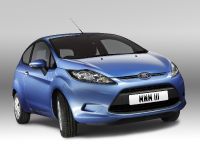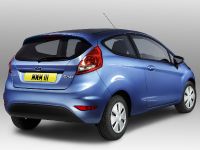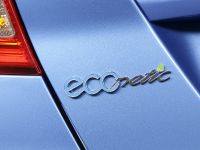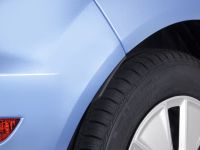Fiesta ECOnetic – Ford’s Most Frugal Car
Bringing style and new levels of low-CO2 efficiency, Ford of Europe's most frugal car – the new Fiesta ECOnetic – heads the Fiesta range at this year's Paris Show.
Powered by a specially-calibrated version of the 90 PS 1.6-litre Duratorq TDCi, combined with coated Diesel Particulate Filter, Ford's most economical Fiesta can travel 100 kilometres using just 3.7 litres of fuel, on the EC Combined Cycle. This impressive fuel economy is matched with a class-leading CO2 output of 98 grams per kilometre – making Fiesta ECOnetic the lowest CO2 vehicle in both its segment and Ford's European range.
Compared to previous-generation Fiesta 1.6-litre TDCi, Fiesta ECOnetic will use 160 litres less fuel over 20.000 km, offering genuine savings in daily driving, at a time when saving fuel means saving even more money.
Extra-urban highway fuel economy is even better – Fiesta ECOnetic requires just 3.2 litres to cover 100 kilometres. Yet this efficiency is not at the expense of driving quality or performance, with Fiesta ECOnetic reaching 0-100 km/h in 12.3 seconds and a top speed of 178 kph.
This is because Fiesta boasts the same attention to detail as earlier ECOnetic models, with improved aerodynamics, low rolling resistance tyres and enhanced lubrication to achieve best possible CO2 and fuel consumption. Lowered ride height and aerodynamic details such as wheel covers and wheel deflectors build on Fiesta's already streamlined drag co-efficient (Cd) of 0.33.
At the same time, low rolling resistance tyres in an economical 175/65 R14 profile, a longer final drive gear ratio and special lubricants drive efficient powertrain performance, especially in highway cruising. In conjunction with energy partner BP, Ford has developed low-viscosity transmission and low-friction engine oils for its ECOnetic models.
Such modifications create Fiesta ECOnetic's class-leading efficiency, without sacrificing the driving quality, style or practicality of the core Fiesta range.
It is not just the ECOnetic version of new Fiesta that benefits from Ford of Europe's sustainability efforts – all new Fiestas feature Electric Power Assist Steering (EPAS), using far less fuel and engine power than a standard hydraulic power assist system, without compromising driving dynamics or steering feedback.
Extensive use of high strength steels and a focus on weight saving has also reduced the mass of new Fiesta by 40 kilogrammes versus the previous model, despite improved safety equipment and sound insulation.
Production powered by renewable sources Sustainability has influenced not only new Fiesta's development, but also the facilities behind its manufacture. Ford's Dagenham Diesel Centre in Britain produces Duratorq TDCi engines for new Fiesta and derives all its electricity from renewable sources, with two dedicated wind turbines and plans for a third.
Ford is also sourcing renewable electricity to cover the full electric power demand of its Fiesta manufacturing and engineering facilities in Cologne, Germany. Through this initiative, the company will reduce its CO2 emissions by 190,000 tonnes per year.
Dr Wolfgang Schneider, Ford of Europe Vice President for Legal, Governmental and Environmental Affairs said, "The new Fiesta is the strongest example yet of Ford of Europe's commitment to and investment in sustainable mobility. Fiesta ECOnetic is a compelling, stylish yet no-compromise choice for customers, offering class-leading low CO2 and genuine savings, while also benefitting from our investment in efficient production facilities."
New Fiesta ECOnetic will be on sale across Europe later this year and completes an initial trilogy of production models in the company's European vehicle range that also includes a 139 g/km Ford Mondeo ECOnetic and a 115 g/km Ford Focus ECOnetic.










